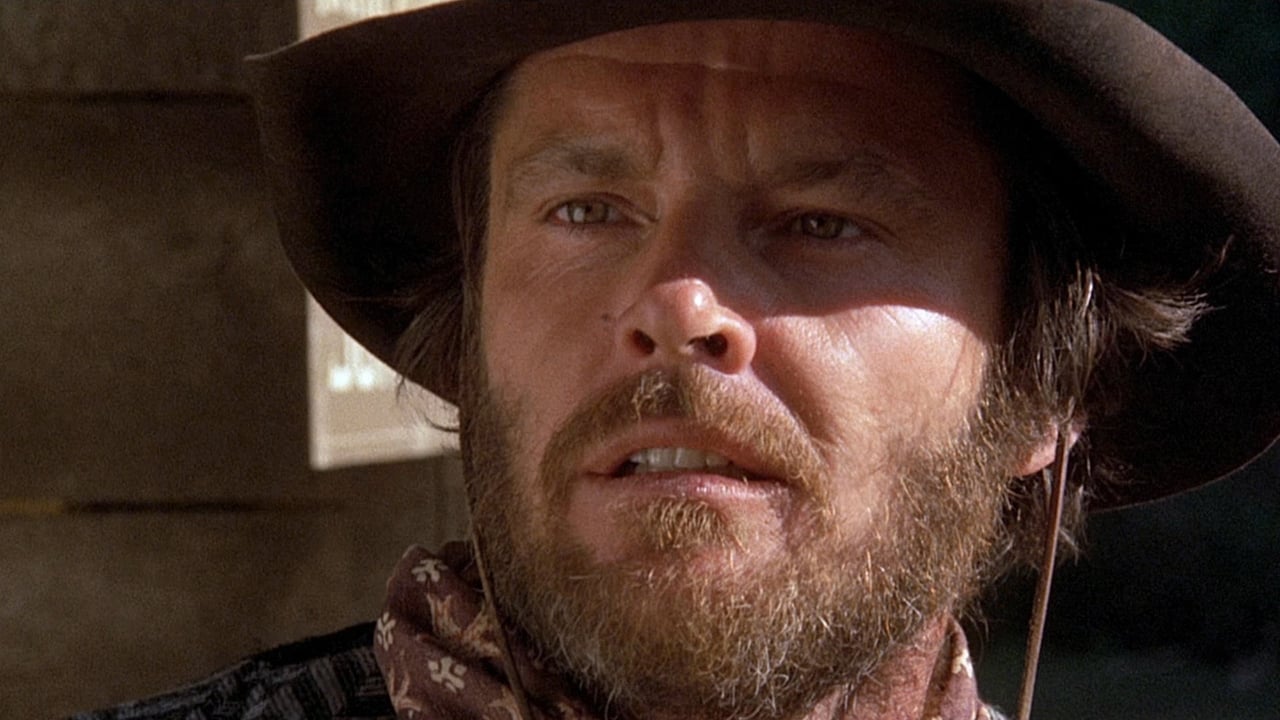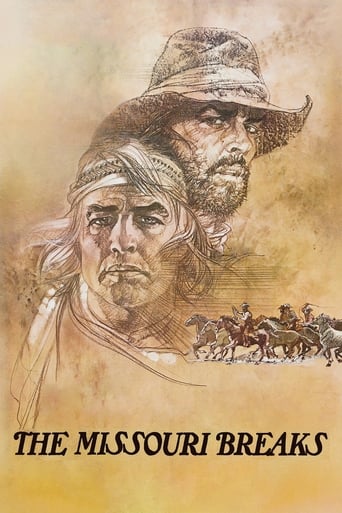

Sorry, this movie sucks
... View MoreThis movie was so-so. It had it's moments, but wasn't the greatest.
... View MoreA great movie, one of the best of this year. There was a bit of confusion at one point in the plot, but nothing serious.
... View MoreThis is a small, humorous movie in some ways, but it has a huge heart. What a nice experience.
... View MoreA rancher, David Braxton, has a problem with horse thieves, and one especially - Tom Logan. Braxton hires a "regulator", Lee Clayton, to hunt down the horse thieves.Interesting movie. Gritty yet often poignant plot. Solid direction. Does take a while to get going though and has a few random twists and turns.Cast is very interesting in that it contains Marlon Brando and Jack Nicholson (this movie is surely the answer to a trivia question, somewhere...). Brando hardly seems to be trying, yet gives a riveting, eccentric performance. Nicholson is great in his role. Solid supporting cast which includes Harry Dean Stanton, Randy Quaid and Kathleen Lloyd.
... View MoreIt might have been a good movie, but Hollywood's kowtowing to actors with recent success ensured that it soundly disappointed those who watched the movie. Marlon Brando's "eccentric" performance proves that as great and magnificent an actor as he was, he was equally as bad when he was not reined in by a director and script. Arthur Penn must bear a lot of the guilt for allowing Brando such a free hand in trashing the movie. I doubt that Marlon's antics went without negative comments and complaints from his fellow actors. Here he was given free rein and ruined what might have been a good movie. Nicholson, Lloyd, Quaid, Forrest, Stanton and other gave good performances, but they are inundated by Marlon Brando's absurdly bad "eccentric" performance. He wasn't eccentric, just BAD! If you skip this one, you will be ahead.
... View MoreThe 1970s saw the release of a number of idiosyncratic or revisionist Westerns (Altman's "Buffalo Bill", "Soldier Blue", "Two Mules For Sister Sarah", "The Life And Times of Judge Roy Bean", "El Topo", "Little Big Man" etc etc). Arthur Penn's "The Missouri Breaks" isn't as outlandish as some of these films, yet still manages to seem wholly strange. Through long, glacial and grand, Penn's film seems preoccupied with small moments and gestures. It's a tiny tale directed with an odd self-importance.The plot? Jack Nicholson plays a minor criminal who eventually decides to settle down on a small farm. The problem? A bounty hunter, played by Marlon Brando, begins to delve into Nicholson's past. One by one Brando kills Nicholson's buddies, until the duo meet for a final showdown. Sounds generic? The film approaches all its clichés from odd angles, subverts all expectations, and stretches and elongates sequences which would otherwise be brushed past.More interesting is Marlon Brando's character, Robert E. Lee Clayton. During this period Brando was creating a number of absolutely ridiculous but downright entertaining characters ("The Godfather", "Burn!", "Mutiny on the Bounty" etc), and his Lee Clayton is no different. Part madman, part genius, flamboyant, incomprehensible, cruel, wild, professional, whimsical, effete, sadistic, strange and deliberately at odds with the naturalism of the rest of the cast, Brando's Clayton steals every scene he's in. He toys with his cast like a cat toys with a ball of yarn.What's interesting is that Brando completely contradicts the intentions of screenwriter Thomas McGuane. McGuande wanted a film about "people and not canvases". He wanted something low-key, slow and human; to capture the tempo and tone of the "real" West. Brando, however, then came in and completely re-wrote his character, demanded huge changes, invented his own weapons and improvised and rewrote much of his (hilarious) dialogue. The result is a film which seems to be pulling in two completely contradictory directions.It's hard to know what else "The Missouri Breaks" is about. Maybe it's about things breaking up and breaking apart. Everyone in the film is torn apart, loses something, and traditional western archetypes seem to be set up only to eventually be confused, made impotent or disposable. Lee Clayton himself seems to be portrayed as a watcher, a man always using binoculars and telescopes and who eventually intrudes upon the film from "outside", tearing things up as he does so. He overwhelms everything, and seems recognised as a threat only by Nicholson, who tries his mightiest to get rid of this weird little man who disobeys all rules.On the negative side, the film is "revisionist" and "subversive" in only the most trite and banal ways, Nicholson never convinces as a man of the period and the film is far too long for such thin material, even if its length does lend a strong, portentous weight to its climax. The film contains a number of great sequences, perhaps the best of which sees Brando donning an old woman's bonnet and dress, delivering odd dialogue whilst a burning log cabin lights up the night sky. Other odd moments include Brando kissing a horse and even singing it love songs. He truly was bizarre.7.9/10 – See "The Long Riders", "Terror in a Texas Town", "The Great Northfield Minnesota Raid", "Lonely are the Brave" and "Broken Lance". Worth one viewing.
... View MoreStarring two titans of cinema in Marlon Brando and Jack Nicholson, The Missouri Breaks sees Arthur Penn (Bonnie & Clyde) direct, the screenplay provided by Thomas McGuane (Tom Horn) and John Williams composes the score. In the supporting cast are Harry Dean Stanton, Randy Quaid, Kathleen Lloyd, Frederic Forrest and John McLiam. With all these people in place the film was one of the most anticipated movies of the year. Anticipation that was not met at the time as the film became a critical and commercial failure. However, time has been kind to the piece and now it shows itself to be far better than the iffy reputation that's afforded it.The story is a sort of working of the Johnson County War that surfaced in the early 1890s in Wyoming, where newer ranchers tried to settle but were set upon by the more established cattle barons of the land. One of the tactics by the wealthier ranch owners was to hire gunmen to terrorise anyone they saw as a threat. Here in Penn's movie we see David Braxton (McLiam) ruthlessly deal with anyone who he sees as a threat to his property. However, when someone enacts revenge on him by hanging his foreman, Braxton hires himself a "Regulator" named Robert E. Lee Clayton (Brando) to seek and destroy as it were. This spells bad news for the rustling gang led by Tom Logan (Nicholson), especially since Logan has started to form a relationship with Braxton's daughter, Jane (Lloyd). Somethings gotta give and blood is sure to be spilt.The most popular word used in reviews for the film is eccentric, mostly in reference to Brando's performance. The big man was growing ever more erratic off the screen and sure enough he changed the make up of his character and improvised at his leisure. Yet it does work in the context of the movie. With his dandy nastiness playing off of an excellent Nicholson turn, McGuane's richly detailed screenplay gets added bite, particularly during the more solemn parts of the story; where patience would be tried were it not for the brogue Irish Clayton. With Penn at the helm it's no surprise to find the piece is an amalgamation of moods. Poignancy hangs heavy for the most part as we deal in the ending of an era and the need to move on. But Penn also delivers much frontier action and snatches of cheery comedy. Then there is the violence, which doubles in shock value on account of the leisurely pace that Penn has favoured. It's sad to think that one of the best splicers of moods was so upset at the reaction to his film he quit cinema for the next five years.The film, well more realistically the reaction to it, possibly sounded the death knell for the Western genre until Eastwood & Costner refused to let it die. The 70s was an intriguing decade for the Oater, with many of them veering between traditional and revisionist. But of the many that were produced, the ones that dealt with the passing of the era, where the protagonists are soon to be relics of a tamed wilderness, have an elegiac quality about them. Penn's movie is fit to sit alongside the likes of Monte Walsh, The Shootist and The Outlaw Josey Wales. Yes it's quirky and is slowly driven forward, but it has many qualities for the genre fan to gorge on. 7.5/10
... View More